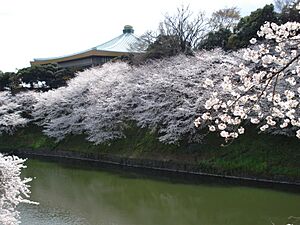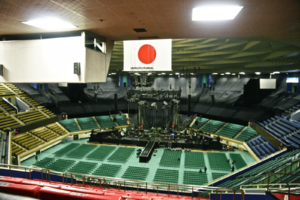Nippon Budokan facts for kids
|
日本武道館
|
|
|
Budokan
|
|
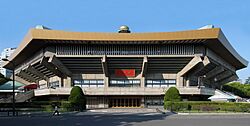 |
|
| Location | 2–3 Kitanomarukōen, Chiyoda, Tokyo 102-8321, Japan |
|---|---|
| Coordinates | 35°41′35.9″N 139°45′0.0″E / 35.693306°N 139.750000°E |
| Public transit | Tokyo Metro/Toei Subway (at Kudanshita):
|
| Owner | The Nippon Budokan Foundation |
| Capacity | 14,471 |
| Field size | Height: 42 m (140 ft) |
| Construction | |
| Built | 1964 |
| Opened | October 3, 1964 |
| Renovated | 2020 |
| Construction cost | 2 billion Japanese yen (US$5.6 million in 1964) |
| Architect | Mamoru Yamada |
| Main contractors | Takenaka Corporation |
The Nippon Budokan, often called just Budokan, is a famous indoor arena in Chiyoda, Tokyo, Japan. It was first built for the 1964 Summer Olympics to host the very first Olympic Judo competition. The Budokan has also been a popular place for professional wrestling and other sports events, like the 1967 Women's Volleyball World Championship. More recently, it hosted judo and Karate for the 2020 Summer Olympics and judo for the 2020 Summer Paralympics.
Even though its main job is to host martial arts contests, the Budokan is also known worldwide as an amazing place for music concerts. Many famous bands and artists have played there. The Beatles were the first rock group to perform at the Budokan in 1966. ABBA held their final live show there in 1980. Lots of artists have recorded live albums at the Budokan, including Bob Dylan, Eric Clapton, Cheap Trick, and Paul McCartney.
Contents
Exploring the Budokan's Location
The Nippon Budokan is located in Kitanomaru Park in the heart of Tokyo. It's just a two-minute walk from Kudanshita Subway Station. The arena is also close to the Tokyo Imperial Palace and Yasukuni Shrine. This tall, eight-sided building can hold 14,471 people. Its design was inspired by the Yumedono (Hall of Dreams) at Hōryū-ji temple in Nara.
The Budokan's Story: From Past to Present
Early Days of the Budokan Area
The land where the Nippon Budokan now stands has a long history. It was once home to an important shrine and later became a residence for powerful families. After Japan's old samurai era ended, the area was used as barracks for the Imperial Guard.
Building the Budokan for the Olympics
In June 1961, judo was chosen as an official sport for the 1964 Summer Olympics in Tokyo. Some members of Japan's parliament, who loved judo, decided to build a special martial arts hall. They wanted it to be a world-class venue in the center of Tokyo. Many lawmakers supported this idea.
On January 31, 1962, the Nippon Budokan Foundation was created. After careful planning, the Budokan was finished on September 15, 1964. The opening ceremony took place on October 3, with the Emperor and Empress of Japan attending. Soon after, it hosted Olympic judo competitions and martial arts exhibitions. Since then, the Budokan has continued to promote various martial arts and host important national events.
Events at the Budokan
Martial Arts Competitions
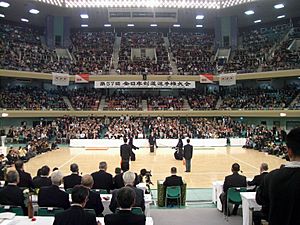
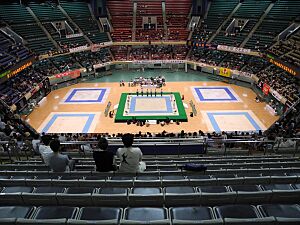
The Budokan is mainly used for Japanese martial arts. National championships for major martial arts like judo, kendo, karate, and aikido are held here every year. It has also been a venue for big professional wrestling shows. The famous Muhammad Ali vs. Antonio Inoki fight in 1976, which was a mix of boxing and wrestling rules, happened at the Budokan. This fight is seen as an early example of what we now call mixed martial arts.
Music Concerts and Performances
The Nippon Budokan became famous worldwide for its music concerts. The Beatles were the first rock group to play there in 1966. Some people were against a Western pop group performing in a martial arts arena.
The Budokan became even more well-known when American artists like Cheap Trick and Bob Dylan recorded live albums there in the late 1970s. Many artists choose the Budokan for live recordings because it has great sound quality. Japanese audiences are also known for being very respectful and quiet during performances, which helps with recordings.
Many other famous musicians have performed at the Budokan over the years. These include Queen, Deep Purple, Mariah Carey, Paul McCartney, and Dream Theater. The record for the most concerts at the Budokan is held by Japanese artist Eikichi Yazawa, with 142 shows as of 2017.
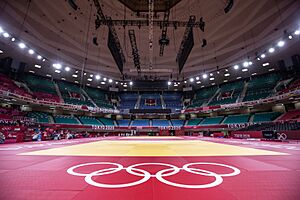
Other Important Events
The Budokan hosts the National Memorial Service for War Dead every year on August 15. This important ceremony is attended by the Prime Minister, the Emperor, and the Empress of Japan.
It has also been the venue for the Japan Record Awards, where artists from across the country receive honors. In 1972, Muhammad Ali won a boxing match against Mac Foster here. The Japan Self-Defense Forces Marching Festival, a yearly military music event, has been held at the Budokan since 1963. In 2022, a state funeral for former Prime Minister Shinzo Abe was held at the Budokan.
Budokan in Games and Media
The Nippon Budokan has even appeared in video games! It was the main setting for the 1989 fighting game Budokan: The Martial Spirit. In this game, players train in Japanese martial arts and then compete at the Budokan. A fictional concert hall based on the Budokan, called "Kaiju Megadome," was in the music video game Guitar Hero III: Legends of Rock (2007). The Beatles' concert at the Budokan was also featured in The Beatles: Rock Band (2009).
See also
 In Spanish: Nippon Budokan para niños
In Spanish: Nippon Budokan para niños
- List of indoor arenas in Japan
 | Delilah Pierce |
 | Gordon Parks |
 | Augusta Savage |
 | Charles Ethan Porter |


